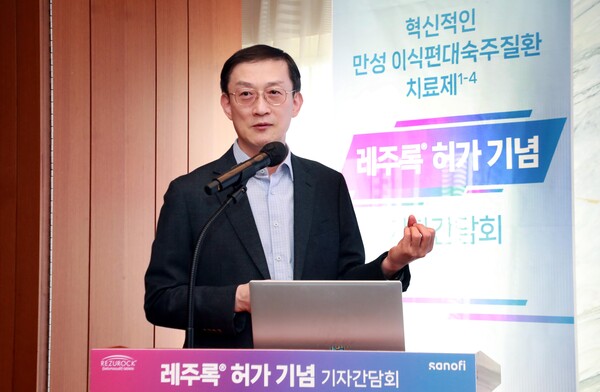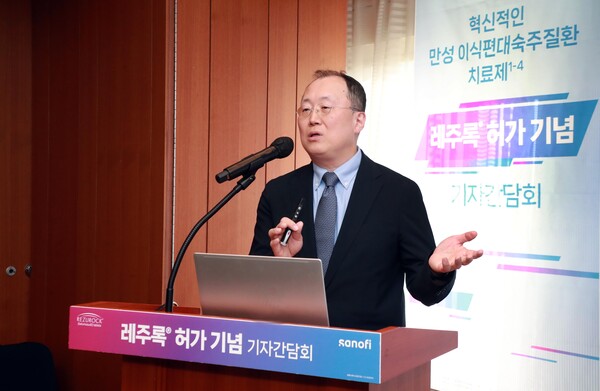Sanofi’s new drug Rezurock (ingredient: belumosudil mesylate), a ROCK2-selective inhibitor, has emerged as a beacon of hope to patients with chronic graft-versus-host disease (cGVHD), a common but severe complication following allogeneic hematopoietic stem cell transplantation.
Over half of cGVHD patients fail to respond to second-line treatments.
To mark the approval of Rezurock, Sanofi Korea held a press conference on Thursday. At the event, local experts said the introduction of Rezurock was a significant development in addressing unmet medical needs.

"Although stem cell transplantation has been performed for over 60 years, cGVHD remains an unresolved complication," said Kim Hee-je, director of Seoul St. Mary's Catholic Hematology Hospital. "cGVHD is the leading cause of non-relapse mortality in blood cancer patients, accounting for 37.8 percent of deaths."
The condition manifests as an immune system abnormality following stem cell transplantation, initially affecting the mucous membranes before spreading to multiple organs including the skin, eyes, muscles, lungs, gastrointestinal tract, and joints.
Kim emphasized that pulmonary complications are particularly concerning, with a mere 13 percent five-year survival rate for affected patients.
The current treatment landscape has been limited, with corticosteroids serving as the primary option despite their significant drawbacks.
"Approximately 70 percent of patients fail to achieve adequate therapeutic effects with steroids," Kim said. "Even with the introduction of Incyte’s Jakafi (ingredient: ruxolitinib) as a second-line treatment, about 50 percent of patients still progress to requiring third-line therapy."
The impact of Rezurock extends beyond symptom management, with Kim expressing optimism about its potential earlier in the treatment sequence.
"While we can't predict which patients will respond best, the fact that we now have a treatment option that offers hope where there was virtually none before is significant,” Kim said. “Based on clinical experience, using Rezurock earlier in combination with other treatments might help prevent organ deterioration."

During the conference, Professor Jung Jun-won of the Department of Hematology Medicine at Severance Hospital shared detailed insights from the ROCKstar clinical trial that led to Rezurock's approval.
"In patients receiving once-daily Rezurock, we observed a 75 percent overall response rate, with 6 percent achieving complete remission and 69 percent partial remission," he reported. "These results significantly exceeded our clinical success threshold of 30 percent."
Jung stressed that the drug's impact on quality of life has been particularly noteworthy.
Among patients receiving Rezurock, 52 percent achieved a clinically meaningful improvement in their Lee Symptom Scale scores, with benefits observed even among non-responders.
"What's remarkable is that we saw improvements across multiple organs, including cases with established fibrosis," Jung said.
Long-term data presented at the European Society for Blood and Marrow Transplantation has further validated Rezurock's efficacy and safety profile.
"The three-year follow-up data shows sustained response rates and tolerability similar to the one-year analysis, alleviating concerns about long-term use," Jung said. The most common serious adverse events included pneumonia (7 percent), hypertension (6 percent), and hyperglycemia (5 percent).
Jung stressed that what was particularly encouraging was the drug's effect on lowering steroid dependence.
"Of the 66 patients receiving concurrent corticosteroids, 64 percent were able to reduce their dosage, and 20 percent discontinued steroids entirely," Jung said. "Among 24 patients on calcineurin inhibitors, 42 percent reduced their dosage, and 17 percent discontinued use."
Meanwhile, Rezurock recently received approval from the Ministry of Food and Drug Safety for treating cGVHD in adults and children aged 12 and older who have failed at least two prior lines of systemic therapy in August.
Sanofi plans to launch Rezurock in Korea by mid-November and aims to submit an insurance coverage application by year-end.
Related articles
- Sanofi’s high-dose vaccine targets flu vulnerabilities in older adults
- Sanofi’s quadrivalent flu shot free for vulnerable groups in Korea
- Sanofi’s atopic dermatitis drug Dupixent gets expanded coverage for treating children under 5
- Sanofi Korea to launch Beyfortus for RSV prevention in infants early next year
- Sanofi’s hexavalent pediatric vaccine added to Korea's national immunization program

